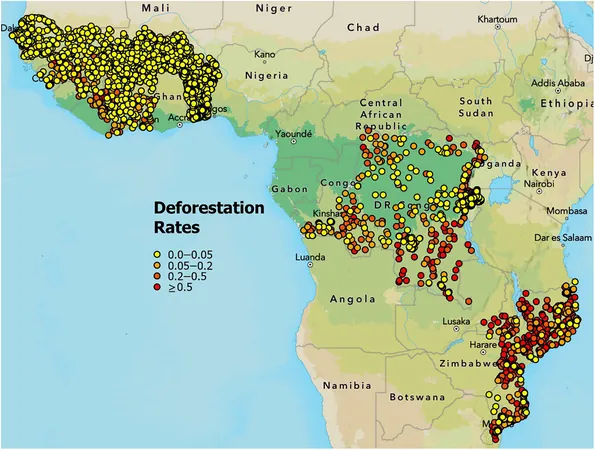
Shocking Study Reveals Deforestation Threatens Malaria Prevention Efforts!
2024-12-05
Author: Mei
Introduction
In an alarming revelation, a new global study exposes how deforestation drastically undermines the effectiveness of one of the most common strategies used in combating malaria—bed nets. While the immediate impact of deforestation is visually apparent, such as bare stumps and muddy fields, this loss extends far beyond mere aesthetics; it jeopardizes the essential health benefits that thriving forests provide.
Impact of Bed Nets
Bed nets, particularly those treated with insecticides, have been a cornerstone in malaria prevention, aiming to shield vulnerable populations from the bites of malaria-carrying mosquitoes during their sleep. However, the study led by researcher Tafesse Estifanos shows a significant correlation between forest preservation and reduced malaria rates among children. The findings reveal that in regions where forests remain intact by over 50%, bed nets can contribute to a remarkable 32% decrease in malaria incidence.
Insights from Researchers
Estifanos posited, “Bed-net use is effective in less deforested areas, but once deforestation surpasses 50% over the studied 20 years, their impact virtually disappears.” This compelling insight from the lead author emphasizes the crucial interdependence between environmental health and human health.
Director's Commentary
Taylor Ricketts, Director of the Gund Institute, calls this study a "wake-up call" for public health and environmental advocates alike. "There remains a monumental oversight in global public health regarding the indispensable role of nature," he stated.
Research Methodology
The research team meticulously compiled a wide array of data including demographic, health, and economic statistics, alongside crucial environmental information such as deforestation rates and climate variables. They categorized these factors into four distinct deforestation rates, offering a comprehensive look at how the state of natural habitats influences health outcomes.
Understanding the Risk
Why does deforestation elevate malaria risk? Ricketts speculates multiple causes, primarily noting that tree loss leads to the formation of stagnant water bodies—breeding grounds for mosquitoes. The team is now set to explore the precise mechanisms by which deforestation affects the efficacy of malaria prevention measures like bed nets.
Building on Previous Research
This study builds on previous research linking deforestation to increased malaria risk, particularly highlighted in low-income communities across six countries. Co-author Brendan Fisher expressed the significance of this large-scale analysis involving nearly 20,000 children, emphasizing the need to understand the interaction between natural environments and malaria transmission.
Concluding Remarks
The overarching message from Estifanos and Ricketts is clear: preserving forests is not just an environmental ambition but a vital public health strategy. "In regions burdened by poverty and scarce resources, conserving nature serves a dual purpose of safeguarding both the environment and human health," Estifanos explained.
Call to Action
Ultimately, the findings showcase a critical warning: public health initiatives could potentially be rendered ineffective if deforestation continues unchecked. Ricketts added, "If we neglect the care of our natural surroundings, we risk reversing the significant advancements we've made in public health." By prioritizing the conservation of the environment, we can enhance the effectiveness of public health strategies against malaria. This study serves as a catalyst for re-evaluating global health policies to ensure that we don't just combat diseases but also protect the ecosystems that support our survival.



 Brasil (PT)
Brasil (PT)
 Canada (EN)
Canada (EN)
 Chile (ES)
Chile (ES)
 España (ES)
España (ES)
 France (FR)
France (FR)
 Hong Kong (EN)
Hong Kong (EN)
 Italia (IT)
Italia (IT)
 日本 (JA)
日本 (JA)
 Magyarország (HU)
Magyarország (HU)
 Norge (NO)
Norge (NO)
 Polska (PL)
Polska (PL)
 Schweiz (DE)
Schweiz (DE)
 Singapore (EN)
Singapore (EN)
 Sverige (SV)
Sverige (SV)
 Suomi (FI)
Suomi (FI)
 Türkiye (TR)
Türkiye (TR)